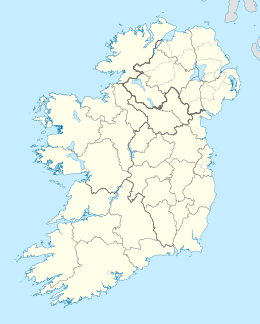Rutland, Ireland
| Native name: Inis Mhic an Doirn | |
|---|---|

Remains of Conyngham's fishing complex on Rutland Island.
|
|
| Geography | |
| Location | Atlantic Ocean |
| Coordinates | 54°58′45″N 8°27′32″W / 54.97917°N 8.45889°WCoordinates: 54°58′45″N 8°27′32″W / 54.97917°N 8.45889°W |
| Administration | |
| Province | Ulster |
| County | Donegal |
| Demographics | |
| Population | 1 (2011) |
Rutland Island (Irish: Inis Mhic an Doirn), also sometimes known as Inishmacadurn, is an island in County Donegal, Ireland, and an electoral and census reporting district covering it, surrounding islands and part of the mainland. The island itself has no permanent inhabitants, but the district, which includes Burtonport and its environs, had 1,428 residents in 2006. The island lies between Burtonport and the inhabited Arranmore Island, and is not officially served by ferry.
The island was previously populated, with a planned settlement having been established by William Burton Conyngham from 1784, including a street of residences and business premises, with the area's post office, school house and a fish landing and processing facility being built in this village. While fish catches declined heavily shortly after construction, with services closing or leaving, the island remained inhabited into the 1960s.
Mains electricity reached the island in 1957, due to it being a crucial stepping stone for the Arranmore supply, but piped water has never been provided for its remaining housing stock, which consists entirely of holiday homes.
A documentary was filmed about the history of the island and its influence on Irish history during the summer of 2007.
Rutland Island has become a popular holiday destination with a number of holiday homes been built in the first decade of the 2000s.
The table below reports data on Rutland's population taken from Discover the Islands of Ireland (Alex Ritsema, Collins Press, 1999) and the Census of Ireland. Census data in Ireland before 1841 are not considered complete and/or reliable.
Badgers have been recorded from this Island.There is evidence that their diet is poor.
The Island is also home to some very tame foxes.
The following algae have been reported from Rutland South Channel: Gracilaria gracilis (Stackhouse) Steentoft, L.M. Irvine et Farnham; Rhodymenia holmesii Ardissone; Polysiphonia fucoides (Hudson) Greville; Polysiphonia nigra (Hudson) Batters; Sphondylothamnion multifidum (Hudson) Nägeli; Heterosiphonia plumosa (J. Ellis) Batters.
...
Wikipedia

